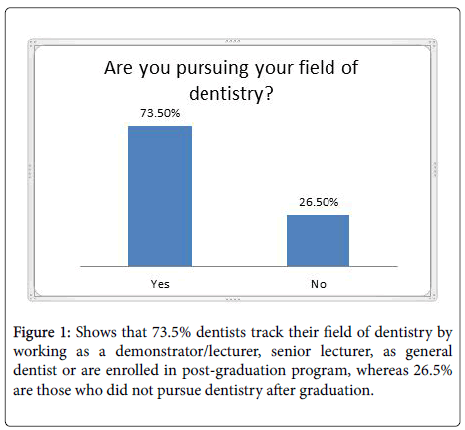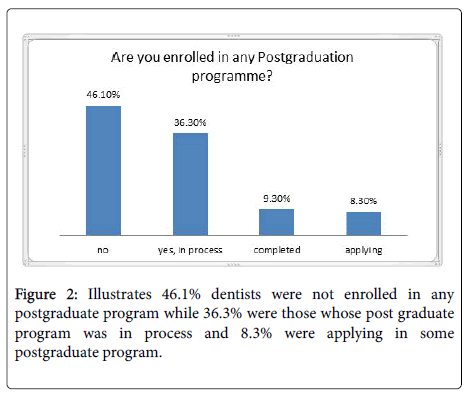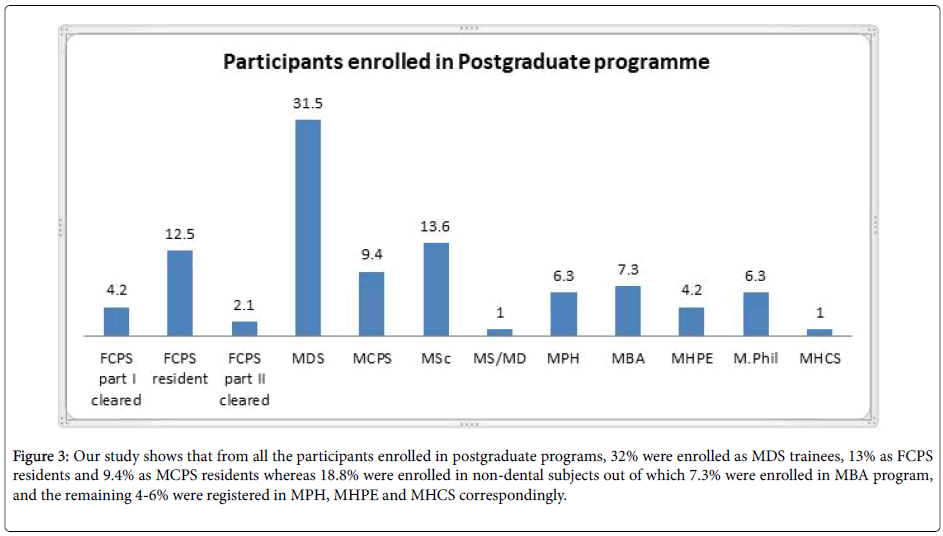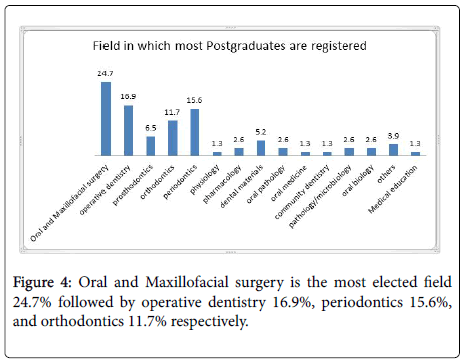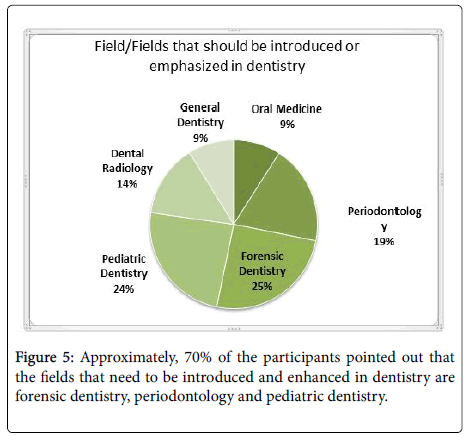Obscure State of Dental Graduates in Karachi, Pakistan
Received: 30-Jan-2020 / Accepted Date: 13-Feb-2020 / Published Date: 20-Feb-2020 DOI: 10.4172/2332-0702.1000255
Abstract
Background: Each year, many students qualify as dental surgeons according to PMDC (Pakistan Medical and Dental Council) standards. At present the field of dentistry is confronting huge difficulties in Karachi because of the rising number of unsatisfied dental alumni predominantly in light of low prospects of work and post-graduation.
The aim of conducting this research is to highlight some dental issues that need attention namely the increase in the rate of unemployment of dental graduates, limited number of courses, fields, and seats for Post-Graduation.
Methods and Materials: A cross sectional survey was carried out from dental graduates using non-probability convenient sampling technique, working at different government and private dental institutes/hospitals, clinics or who were unemployed. This study was conducted from July 2018 to October 2018.
Results: In this survey 86.5% female and 13.5% male dentists participated. It was found that 73.5% dentists trail their field of dentistry by working at different positions, at the same time around 70% of dentists have worked on unpaid/honorary positions after graduation. This survey shows that 74.1% of the graduates are willing to go for PostGraduation in future.
Conclusion: Dentistry is a vital service industry. It needs more focus on improvement of job opportunities for the present and upcoming dentists. There is a prerequisite to introduce a number of new fields in dentistry that are being practiced all around the world. This would not only benefit the industry but is also important for the healthier community in longer run.
Keywords: Dental graduates; Employments; Challenges; Postgraduate courses; FCPS; MDS
Introduction
Stress background
Dentistry is a respectable profession with an attractive pay scale throughout the world. It takes years of devotion and uphill struggle to accomplish the degree of Bachelors of Dental Surgery [1].
Every year, many students qualify as Dental Surgeons fulfilling PMDC (Pakistan medical and dental council) standards. On one hand the increase in number of dental graduates is beneficial for overall good oral health of the country. On the other hand, the field of dentistry is facing significant challenges due to the growing number of unsatisfied dental graduates, mainly because of lack of jobs and minimal post-graduation options leading to an oversaturation [1].
Dental graduates seek employment either in a teaching hospital setup as demonstrator/dental officer or in a private dental practice. Unfortunately there are not many dental hospital setups [2] available in Karachi to help with the unemployment issue. Due to this, qualified dental graduate take up unpaid/honorary positions in hopes of being paid in the near future. It was seen in a study that “Professionally Contained Career” was an underlying desire while selecting Dentistry as career and absence of this results in demotivation and frustration [3].
Opening one’s own practice requires a healthy investment. The cost of equipments and locality of clinic needs sound financial support [2,4]. Even if all is arranged, a private practice is difficult to sustain owing to factors such as mushrooming of private clinics in selected areas [5].
Considering the difficulty in scoring jobs and establishing a private practice, post-graduation beams as the best and preferred option. Fellowship and membership programs of CPSP and Masters in Dental Surgery (MDS) courses recognized by PMDC (Pakistan medical and dental council) and HEC (higher education commission) are chosen most commonly among the dental graduates [6]. Unfortunately, the numbers of postgraduate seats offered are very few with limited supervisors and lesser stipend.
Owing to the massive influx, there is a tough competition to get enrolled in these courses. After passing the demanding FCPS part I exam, many dentist still remain unemployed waiting for a paid/unpaid residency. Similarly, very few dental colleges are currently offering MDS and each year a decrease in the number of fields and seats offered is observed.
Other options for post-graduation include M. Phil (in basic sciences), MSc, clinical certificate courses and diplomas, MHPE, MPH/ MSPH, MBA, clinical research and administrative services [7]. But later options take you away from clinical dentistry-a dream of every graduating dentist. Some of these courses are only recognized by HEC and not by PMDC and due to this reason there are less chances of professional growth in dentistry.
Rationale
• The purpose of conducting this research is to highlight the following issues in Pakistani dental community:
• Lack of jobs after dental graduation leading to ample number of dentists working on an honorary/unpaid position.
• Limited fields and courses for post-graduation.
• Restricted number of post graduate seats.
Materials and Methods
Subject and method
A questionnaire based study consisting of 26 questions was designed to evaluate the ‘current status of dental graduates and opportunities for post-graduation ’ . The questionnaire consisted of 20 close ended questions and 6 open ended questions that included age, year of graduation, current position, and month/year worked as unpaid employee and suggestion to upcoming dentists.
Sample size
Sample size for this study was estimated using open epi sample size calculator version 3.01, after inserting 50.9% prevalence of job dissatisfaction with 7.5% margin error and 95% confidence interval we got n=196 sample size for the study, however we took n=200 [8].
Sampling technique
The study was conducted using non-probability convenient sampling technique. Participants were conveniently selected.
Study design and population
A cross sectional survey was conducted among 200 dental graduates who were either working at different government and private dental hospitals, clinics, educational institutions or were unemployed. The age of participants ranged from 24-35 years with mean age of 28 years. This study was conducted from July 2018 to October 2018.
Statistical analysis
Data was stored and analyzed using IBM-SPSS version 23.0. Counts and percentages were reported as of the information received from the participants on basis of current dental employments, salaries, postgraduate opportunities, available fields and the fields that need introduction in dentistry. Bar and pie charts were also used to give the graphical presentation of the results.
Results
A survey consisting of 200 dental graduates working at different government and private dental hospitals, clinics, educational institutions, or some of them were out of work. The employed individuals were working as general dentist, post graduates residents or teachers are shown in (Table 1) and in (Figure 1).
| Variable | N | % | |
|---|---|---|---|
| Gender | Female | 173 | 86.5 |
| Male | 27 | 13.5 | |
Table 1: Out of 200 participants, 173 (86.5%) were female dentists and 27 (13.5%) were male dentists.
The major reason of not pursuing was due to the lack of jobs 64.4%, followed by family commitments 33.8% or because they have moved out of Pakistan 11.8%. (Table 2) shows that around 70% of dentists have worked on unpaid/honorary positions for some time after graduation before they became paid employee, from which 44.5% have worked as an honorary employee for 1-6 months and 14.5% worked for 7-12 months (Figure 2).
| Characteristics | n | % |
|---|---|---|
| If Not pursuing dentistry, what are the reason/reasons? | ||
| Lack of Jobs | 38 | 64.4 |
| Family Commitments | 20 | 33.8 |
| Moved out of Pakistan | 7 | 11.8 |
| Have you ever worked as an unpaid employee after graduation? | ||
| Yes | 136 | 68.7 |
| No | 58 | 29.3 |
| Not Applicable | 4 | 2 |
| If Yes, for how many months or year have you worked unpaid? | ||
| 1-6 months | 89 | 44.5 |
| 7-12 months | 29 | 14.5 |
| 1.5 -2 years | 10 | 5 |
| 4 years | 1 | 0.5 |
| No | 1 | 0.5 |
| Are you satisfied with your current job? | ||
| Yes | 89 | 45.2 |
| No | 78 | 39.6 |
| Not Applicable | 30 | 15.2 |
| Are you satisfied with your current salary? | ||
| Yes | 31 | 15.8 |
| No | 135 | 68.9 |
| Not Applicable | 30 | 15.3 |
Table 2: Shows that around 45.2% dentists were satisfied with their present job whereas approximately 40% were dissatisfied with their job at the same time 68.9% were discontented with their salary.
Most of the dentists did not enroll in any postgraduate program due to family commitment 22.9%, long duration of courses 15.9%, financial problems 13.3%, lack of motivation 11.4% and lack of knowledge 10% is shown in (Table 3 and Figure 3).
| Characteristics | n | % |
|---|---|---|
| If you are not registered in any postgraduate course what is the reason (reasons)? | ||
| Family commitment | 36 | 22.9 |
| Long duration of courses | 25 | 15.9 |
| Financial problems | 21 | 13.3 |
| Lack of motivation | 18 | 11.4 |
| Lack of knowledge regarding postgraduate courses | 16 | 10.1 |
| Programmes not internationally recognized | 16 | 10.1 |
| Failed multiple entry test attempts | 9 | 5.7 |
| Interested in a programme not approved by PMDC | 8 | 5 |
| Well paid job | 6 | 3.8 |
| Family business | 2 | 1.2 |
| Are you planning to for post graduation in future? | ||
| Yes | 126 | 74.1 |
| No | 13 | 7.6 |
| Not Applicable | 31 | 18.2 |
| Field/Fields that should be introduced or emphasized in dentistry | ||
| Forensic Dentistry | 108 | 24.7 |
| Pediatric Dentistry | 103 | 23.6 |
| Periodontology | 82 | 18.8 |
| Dental Radiology | 60 | 13.7 |
| Oral Medicine | 39 | 8.9 |
| General Dentistry | 38 | 8.7 |
Table 3: This survey also yields that 74.1% of the graduates who have not started any post-graduation yet are willing to go for postgraduation in future.
Figure 3: Our study shows that from all the participants enrolled in postgraduate programs, 32% were enrolled as MDS trainees, 13% as FCPS residents and 9.4% as MCPS residents whereas 18.8% were enrolled in non-dental subjects out of which 7.3% were enrolled in MBA program, and the remaining 4-6% were registered in MPH, MHPE and MHCS correspondingly.
Discussion
Dentists all around the world enter this field with great enthusiasm, interests and desires, investing great amounts financially for lengthy period of studies and training only to attain a high professional status, a secure career and a high income [9].
Unfortunately, the dental graduates in Karachi, Pakistan are in a state of crisis. After all the hard work, the dental graduates end up frustrated because they see no light at the end of the tunnel.
After witnessing so many frustrated qualified dental surgeons around us working as unpaid employees and also being a victim; we planned to research about the current scenario of dentists. Our study was conducted among 200 Dental graduates (173 Female, 27 Male) working in both private and public dental facilities or pursuing postgraduation. The age of participants ranged from 24-35 years with mean age of 28 years.
A high level of doctor satisfaction impacts positively on the health services quality and patients satisfaction [8]. According to our research approximately 40% of dentists were not satisfied with their current job. The major reason of dissatisfaction was inadequate salary. Similar results were reported in a study in Sudan which displayed that 51% of doctors were dissatisfied with their job and majority of their respondents displayed very high level of dissatisfaction for payment of their basic salary 72.3% and incentives 69.1%.
The participants were evaluated for their initial salary and it was found that a shocking 68.7% had to work on an unpaid/honorary position during the start of their career. A huge amount 44.5% worked without being paid for a period of 1-6 months where as 14.5% were those who worked unpaid for a period of 7-12 months. A number of dentists 26.5% did not pursue their career in dentistry; the major reason was lack of jobs 64.4%.
According to our study a larger chunk 74% of dental graduates were interested in post-graduation in future. Almost comparable results were obtained in two studies conducted in Saudi Arabia [10,11] which reported 65-80% of respondents were interested in obtaining higher dental education. The dental graduates who wish to pursue postgraduate studies cannot do so due to limited number of postgraduate positions in each specialty, limited number of supervisors and institutions that train postgraduate students recognized by the PMDC and only a few postgraduate courses. The two main pathways of becoming a dental specialist in Pakistan are:
• Fellowship of College of Physician and Surgeons (FCPS)
• Masters in Dental Surgery (MDS)
The College of Physicians and Surgeons Pakistan (CPSP) offers residency fellowship only in 5 dental specialties and each supervisor is permitted to take a maximum of 8 trainees (1: 8) for FCPS residency which is fixed by CPSP. It takes an average 6-7 years for an FCPS trainee to graduate [12]. This results in a never ending list of trainees waiting for a suitable training slot.
On the other hand, MDS takes an average duration of 4-5 years [12]. Limited number of Dental universities offer MDS program in Karachi with small number of MDS slots in a few specialties every year. Similar courses in UK and Ireland e.g. the fellowship of The Royal College of Surgeons (RCS) andUniversity MClin Dent take an average of 3 years for specialization which is a quite reasonable time period compared to specialization in Pakistan. If our country has PMDC recognized post-graduation courses for shorter durations; the percentage of specialized dentists will drastically increase, as 15.9% of our participants who did not pursue their post-graduation was due to long duration of courses.
According to a study conducted in Saudi Arabia and India 65-72% dentists [9,13] agreed to the fact that Post graduation is a necessity. Our study shows that 36.3% of the respondents were enrolled in some kind of post graduate program at the same time 46% were not enrolled in any program, whereas 8.3% were applying. About 52% of our participants, who did not register their self in post graduate program, was due to family commitments and long duration of courses and financial problems [14,15].
Several studies have shown female dominance in dentistry [8,16,17]. This situation is very similar to the one in Karachi at the time of enrollment into colleges of dentistry but the situation turns on to the axis of 180̊ as soon as these candidates graduate and come into the action field.
The leading degree of qualification in our study was Masters of Dental Surgery (MDS) 32%, followed by Masters of Science (MSc) in which 14% of our participants were enrolled, 13% were FCPS Residents, 9.4% were enrolled in MCPS which is a 2 year program regulated by CPSP. The dentists hopeless in their own field choose alternative postgraduate programs with expensive fee structures. Some dental graduates change their career field and move outside the health sector [1]. According to our study, 7.3% were doing Masters in Business Administration (MBA) either in Hospital Management or some other field of interest, 6.3% did M.Phil in a non-clinical subject and 6.3% went for Masters in Public Health (MPH) which is not a very attractive postgraduate qualification for a dentist as MBBS are preferred in this field. Masters in Health Public Education (MHPE) is an emerging field to which many dentists are looking forward; 4.2% of our participants were enrolled in this program.
Furthermore, most preferred specialty among different postgraduate programs was also evaluated. Oral and Maxillofacial surgery was on top of the list with 24.7%, followed by Operative dentistry with 16.9%, Periodontics 15.6%, Orthodontics 11.7% and Prosthodontics 6.5% (Figure 4). Various other fields had a percentage ranging from 1-5%.
OMFS being the most preferred field is almost compatible with the findings of a study [9] which reported that OMFS was the most favorable among their male graduates. Similar results were found in study done in India [17] where preference for Oral Surgery was 29.3% whereas for endodontics 19%. In another study conducted in Iran [18]. Orthodontics with 15% was the most preferred choice 15% followed by endodontics 11.3%.
Dental surgeons who do not pursue post-graduation either willingly or due to circumstances search for employment opportunities in government or private dental facilities which are limited. Therefore, establishing a dental practice maybe the only choice for a few graduates [1]. After all the hard work and investing large amounts financially in cost of equipmentsand locality of clinics. Competition in the already saturated market makes things more complicated. In a Study conducted in Saudi Arabia, 62.3% dentists agreed that it takes a lot of time and patience to establish a practice [9]. All this competition in the market builds up frustration and mild to moderate mental health issues [1].
Absence of specialty fields are highly felt in the major provinces of Pakistan [19,20]. The new fields of dentistry that should be introduced or emphasized in Pakistan were evaluated in our study and according to that 70% of our respondents suggested Forensic dentistry, Periodontology and Pediatric Dentistry to be commenced (Figure 5).
These fields have already being accepted as specialty branches by many developed and developing countries [21].
In the end, we inquired from our participants if there is saturation among General Dentists and Dental Specialists, 98% of the general dentist felt that there is saturation whereas 87% dental specialists thought that saturation is a grave problem the dentists are facing nowadays.
It is high time to control the increasing unemployment rate and increasing number of unsatisfied dentists. Several studies had a viewpoint that the steep increase in the number of dental colleges is a threat to the dental profession and the reason for the growing number of dissatisfied dental graduates because of low prospects of job [1,8,9]. Other reasons could be the vacancies for dental professionals in Government sector are very less with questionable selection procedure due to corruption andmalpractices [1]. Limited number of postgraduate positions available in each specialty is one of the reason. The increasing number of graduate dentists may lead to an unbalanced graduate- to-postgraduate dentist ratio [9]. Leading to frustration among dentists. High competition in private practice and lack of awareness about oral health among public makes things more complicated. All this highlights the need for policies to be made to overcome this crisis.
Radical decisions should be made by the stakeholders including PMDC and the Government Department of Health so that the future of dentistry can be planned accordingly. The PMDC has no doubt taken positive initiatives in 2018 regarding strict actions against the Medical and Dental Colleges that were not up to the PMDC guidelines/standards.
Other ways to overcome this problem can be:
• By creating new posts for dental graduates in public hospitals.
• By opening new private and public dental services.
• Oral Health programs should be planned to increase oral health awareness among population [1,22].
• Increase the number of postgraduate seats to meet the demand of graduating dentists [23].
• Introduction of new dental fields on planned basis that are already being practiced all around the world, ultimately creating more opportunities for dentists to pursue their career [24,25].
All these steps can be taken to retain the interest of dental graduates within the dental stream so that the highly trained dental manpower of the country does not go in vain.
Conclusion
From the above survey it is inferred that Dentistry is a vital service industry. It needs more spotlight on enhancement of job opportunities, for the present and upcoming dentists – for the survival of the respectability of dental network and social insurance of nation in the more extended run. There is a prerequisite to introduce a number of new fields in dentistry that are being practiced all around the world. This will open doors to new opportunities for the dentists. Postgraduate seats should also amplify so that our country has more specialized dental surgeons and consequently more supervisors for postgraduate programs. All these steps should be taken to reinforce the dental community and ultimately the oral health of the country.
Acknowledgement
The authors would like to acknowledge the assistance provided by Sir Adnan Ali, Dr. Aisha Faraz, Dr. Noor ul Ain and faculty members of LCMD.
References
- Yada S, Rawal G (2016) The current status of dental graduates in India. Pan Afr Med J 23: 22.
- Ahuja NK, Parmar R (2011) Demographics and Current Scenario with Respect to Dentists, Dental Institutions and Dental Practices in India. Indian J Dent Sci 3: 8-11.
- Aggarwal A, Mehta S, Gupta D, Sheikh S, Pallagatti S, et al. (2012) Dental students’ motivations and perceptions of dental professional career in India. J Dent Educ 76: 1532-1539.
- Dagli N, Dagli R (2015) Increasing unemployment among Indian dental graduates-High time to control dental manpower. J Int Oral Health 7: 1-2.
- Yadav R, Rai R (2016) Dental education: Do we really have too many graduates?Br Dent J 220: 558.
- Assael L (2017) Current status of postdoctoral and graduate programs in dentistry. J Dent Educ 81: eS41-eS49.
- Jain H, Agarwal A (2012) Current scenario and crisis facing dental college graduates in India. J ClinDiagn Res 6: 1-4.
- Suliman AA, Eltom M, Elmadhoun WM, Noor SK, Almobarak AO, et al. (2017) Factors affecting job satisfaction among junior doctors working at teaching hospitals in River Nile State, Sudan. J Public Health Emerg 1: 79.
- Halawany HS (2014) Career motivations, perceptions of the future of dentistry and preferred dental specialties among Saudi dental students. Open Dent J 8: 129-135.
- Al-Homaidhi MA (2017) Motivations and career plans of senior dental students at king Saud University, Riyadh, Saudi Arabia. Pak Oral Dent 37: 597-600.
- Çapan BŞ, Akyüz S, Bahcecik N, Yarat A, Girgin F, et al. (2018) Factors Influencing Career Choices of Dental Students in a State University in Turkey. ClinExp Health Sci 8: 228-236.
- Hameed MH, Khan BF, MCPS F (2017) Management of Edentulous Maxilla with Sagittal-Transverse Deficiency Presenting with Repeated Implant Failures: A Case Report. J Pak Dent Assoc 26: 94-97.
- Sapna B, Nadaf N, Badroon SN, Rahim ZH, Tan R, et al. (2015) Assessment of motivational factors and career aspirations of dental interns in Davangere city: A cross-sectional survey. Int J Oral Health Sci 5: 93-98.
- Al-Dlaigan YH, AlBarakati SF, Al-Habeeb F, Al-Hulaily M (2012) Career characteristics and postgraduate education of female dentist graduates of the College of Dentistry at King Saud University, Saudi Arabia. Saudi Dent J 24: 29-34.
- Sultan S (2018) Pedodontics and preventive dentistry as career option: post graduate student’s perspective. Int J Res Med Sci 6: 677-681.
- Puryer J, Selby J, Layton J, Sandy J, Ireland A, et al. (2017) The association between postgraduate studies, gender and qualifying dental school for graduates qualifying from UK dental schools between 2000 and 2009. Dent J 5: 11.
- Aditya S (2013) Motivations and future aspirations of dental interns: A cross-sectional study. SRM J Res Dent Sci 4: 114-118.
- Jahangir H, Molook T, Mehran N (2018) Postgraduate Specialties Interest and Related Factors in Dental Students at Kerman University of Medical Sciences. EC Dent Sci.
- Khan FR, Mahmud S, Rahman M (2013) The need of paediatric dentistry specialists in Pakistan. J Coll Physicians Surg Pak 23: 305-307.
- Farhan RK (2018) Challenge of Producing Specialist Practitioners in Periodontology in Pakistan. J Coll Physicians Surg Pak 25: 3.
- Tanalp J, Ilguy D, Dikbas I, Oktay I (2012) Demographic profile and future expectations of students enrolled in a Turkish private dental school. J Dent Educ 76: 800-809.
- Sajjad S, Azam S (2015) Oral health education in public schools of Rawalpindi city. Pak Orthodon J 7: 66-69.
- Bhagwani H, Mishra SK, Yadav NS (2017) Choosing dentistry as a career: A matter of concern–a survey. New Niger J Clin Res 6: 16-20.
- Amin M, Ahmad B (2010) Dental education in Pakistan: current trends and practices. J Coll Physicians Surg Pak 8: 497-498.
- Al-Dlaigan YH, Al-Ghamdi M, Al-Shahrani A, Al-Shahrani M (2011) Postgraduate specialties interest, career choices and qualifications earned by male dentists graduated from King Saud University. Saudi Dent J 23: 81-86.
Citation: Shahid A, Khan M, Saeed S, Shah B, Qureshi N, et al. (2020) Obscure State of Dental Graduates in Karachi, Pakistan. J Oral Hyg Health 8: 255. DOI: 10.4172/2332-0702.1000255
Copyright: © 2020 Shahid A, et al. This is an open-access article distributed under the terms of the Creative Commons Attribution License, which permits unrestricted use, distribution, and reproduction in any medium, provided the original author and source are credited.
Select your language of interest to view the total content in your interested language
Share This Article
Recommended Journals
Open Access Journals
Article Tools
Article Usage
- Total views: 4966
- [From(publication date): 0-2020 - Dec 10, 2025]
- Breakdown by view type
- HTML page views: 4096
- PDF downloads: 870

